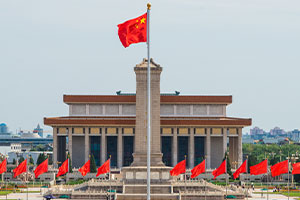
China’s rapid demographic decline is fast becoming a severe population crisis. This unexpected shift can be traced back to misjudgments made over 40 years ago. Deng Xiaoping’s implementation of a controversial population control policy in 1979 was considered one of history’s most significant and disastrous social experiments.
In response to China’s growing population, Deng Xiaoping approved a radical solution limiting each couple to just one child to combat overpopulation and maintain sustainable growth. This led to the nationwide enforcement of the infamous one-child policy.
The policy was conceived in the context of a worldwide panic over a global population explosion in the sixties and seventies. This specter echoed the warnings of economist Thomas Malthus (1766-1834), who is known for his theory that population growth will always tend to outrun the food supply and that the progress of humanity is impossible without limits on reproduction.
In response to this perceived threat, the Communist Chinese government turned to a rocket scientist trained in Moscow. Song Jian, a prominent scientist with a unique background in military science and mathematics, engineered the one-child policy. He used mathematical models derived from rocket trajectory calculations and applied them to population growth. He was China’s senior cabinet member overseeing science and technology.
In 1975, Song was part of a Chinese academic delegation that visited the University of Twente in the Netherlands, where he met Dutch mathematician Geert Jan Olsder. Olsder, now in his eighties, reminisced that his discussions with Song influenced the mathematical models of missile trajectories that gave rise to the one-child policy.
As Song and his scientific team fine-tuned these models, he projected the impact of varying fertility rates on China’s population. By late 1979, he presented reports based on these models, revealing alarming projections. He calculated that sustaining a fertility rate of three babies per woman would skyrocket China’s population to 4.26 billion by 2080.
Help Remove Jesus Bath Mat on Amazon
When issuing the policy, officials suggested the possibility of adjusting strategies if the birth rate declined too sharply. A Communist Party statement in 1980 stated that an evaluation would be made after 30 years to see if more liberal population models might be implemented.
The failure of the policy started ten years later when fertility rates quickly fell below replacement levels. Adding to the problem was the rapidly decreasing number of newborn girls.
As time passed, demographers and economists criticized the policy as outdated and flawed. They argued that China’s fertility rate would have naturally decreased with rising life expectancies and improved economic conditions.
The enforcement of the policy brought about the unintended consequence of creating a one-child mindset. Decades of forced abortions and sterilizations drove couples to avoid unauthorized pregnancies. Propaganda promoting the advantages of small families had the desired effect on the population. In addition, the traditional preference for sons created a surplus of males, making finding marriage partners more difficult.
Satanic Christ Porn-blasphemy at Walmart — Sign Petition
China’s Communist Party inadvertently changed the culture, not only policy. Now, the Party is finding it impossible to reverse the situation by changing the policy.
Presently, young women stand at the heart of China’s demographic challenge. Their reluctance to have children is growing, compounded by a diminishing population of young women.
Harvard anthropologist Susan Greenhalgh noted that women raised under the one-child policy were groomed to fit Beijing’s vision of a “higher-quality” of life population: educated, astute, worldly and independent. These women are unlikely to revert to traditional roles as housewives any time soon, if at all.
Beyond societal shifts, Song’s model disregarded economic influences, like the significant urban migration unleashed by Deng’s reforms, which had a more substantial impact than anticipated in driving down fertility rates.
How Panera’s Socialist Bread Ruined Company
Even after demographers raised concerns a decade ago, Song supported maintaining zero population growth. When China’s one-child policy was lifted in 2015, some birth restrictions still remained.
Demographers are racing to address the sharp decline in births with data that is constantly changing. The United Nations’ population projections for China, which are based on the 2020 census and assume a fertility rate of 1.19, are already outdated.
Projections by experts from Victoria University in Australia and the Shanghai Academy of Social Sciences paint a grim picture. They anticipate China’s population to dwindle to just 525 million by the century’s end, down from the current 1.4 billion.
The implications for the future are overwhelming. Few young workers plus an older retiring population means a bankrupt elder care and pension system.
What Does Saint Thomas Aquinas Say About Marriage?
According to forecasts by the state-run Chinese Academy of Sciences, the current pension system is projected to be depleted by 2035. By then, the population of Chinese citizens above the national retirement age of 60 is expected to surge from roughly 280 million to 400 million.
China’s population policies have long relied on a materialistic outlook that reduces everything to economic and scientific speculations. These projections do not include cultural and spiritual considerations that significantly impact population growth.
The communist ideology rejects the God-given natural order that regulates and orients all things to Him. When people resolve to live according to God’s law, these problems are resolved.
Communist China chose to impose an anti-natural system upon its people. Now, it must reckon with the unintended consequences of meddling with God’s plan for China.
The solution is a return to order and God. It is actually quite simple—it’s not rocket science…
Photo Credit: © superjoseph – stock.adobe.com


